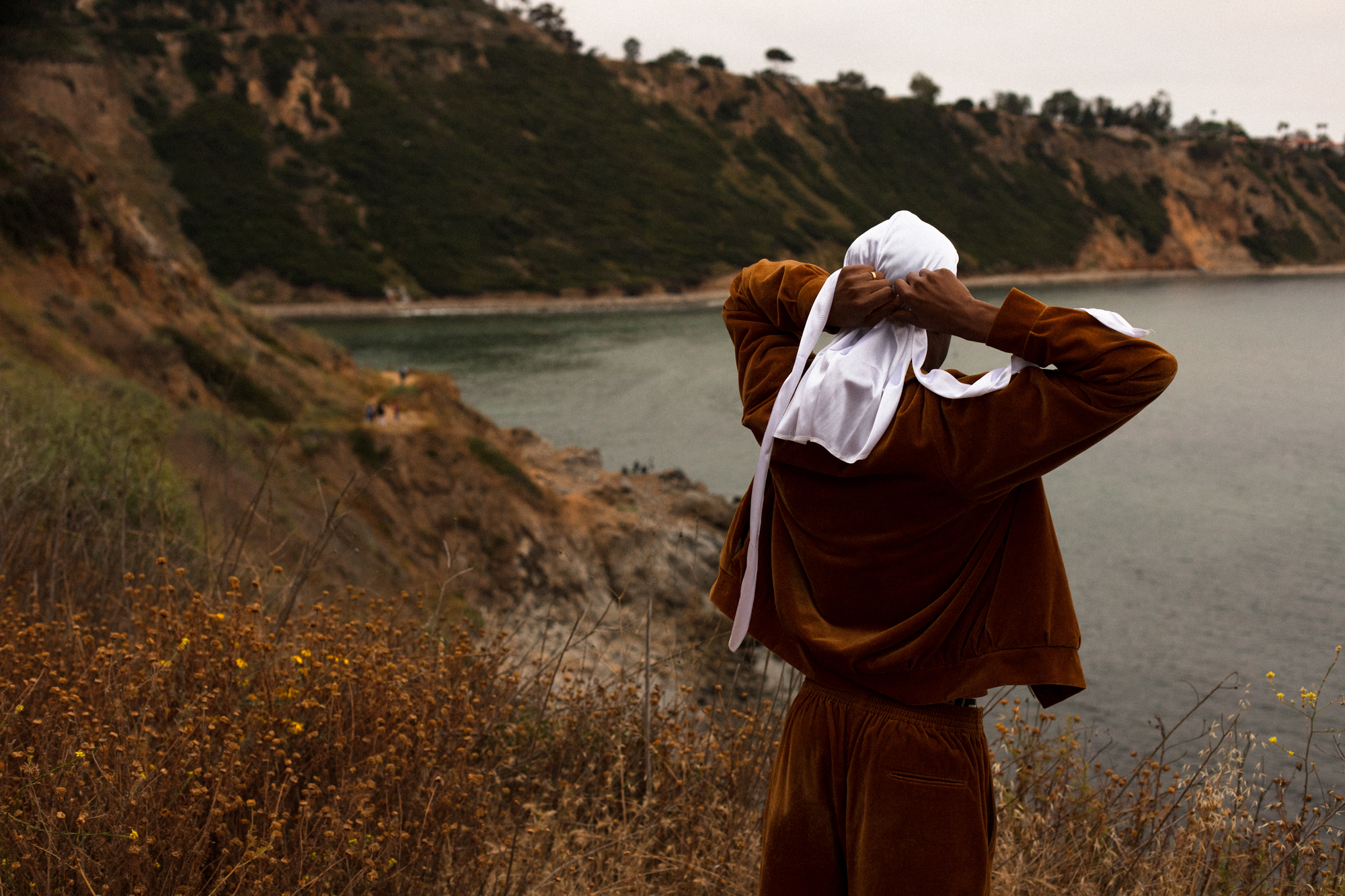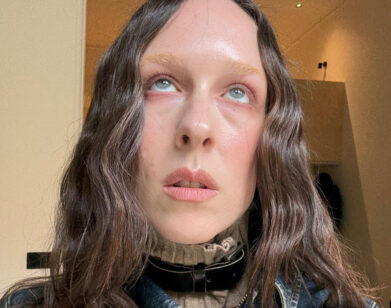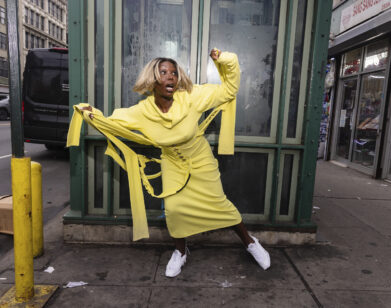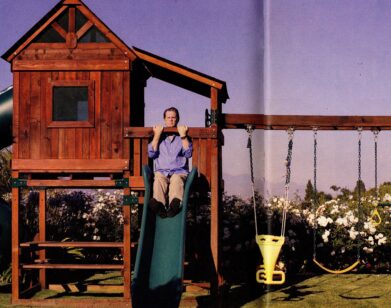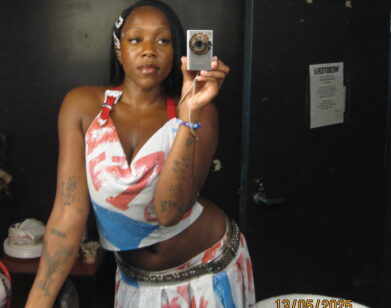Naeem Tells Moses Sumney Why It Was Time to Retire Spank Rock

Call it what you want. Transformation. Evolution. Reinvention. For Naeem Juwan, dropping his Spank Rock alter ego felt more like liberation. Although the name was spot-on for the type of raunchy party-rap personified on his 2006 breakthrough YoYoYoYoYo, as Juwan matured, both as an artist and a person, he discovered that being Spank Rock came with certain expectations. The persona he’d built—wild, unencumbered, and straight-up nasty—overshadowed the person who built it. Now, he performs simply as Naeem, a logical next step for a musician who wants to be no more than who he is. The result is Startisha, Juwan’s first album in nine years, a spacious, sonically curious record that sees the 39-year-old exploring new emotional and sonic ground. No two songs sound the same, and while he does revisit his Baltimore club roots on the brazen single “Woo Woo Woo,” Startisha is more notable for songs like its title track, a floating anthem written about a childhood friend that sees Juwan stretching his singing voice into a falsetto as he meditates on the complexity of Black womanhood. As Juwan tells the musician Moses Sumney, it’s the kind of song he dreamed of making when he became Naeem.
———
MOSES SUMNEY: Thanks for wanting to have me do this.
NAEEM: Thanks for not turning me down.
SUMNEY: Well, you have to say yes once every couple of months, so this is my yes. Hopping right into the question you’re going to get asked a million times: Why did you want to change your name professionally to Naeem with this record?
NAEEM: By the time the record was done, I felt like everything was so different. My whole team was different. Everyone I was making music with was completely different. By the end it felt really natural to change my name. But it’s not really a name change since I’m now using my actual name.
SUMNEY: Often when someone switches to their real name, it feels like a moment of reckoning, or a moment of coming home. Maybe it’s a moment of new intimacy or exposing themselves. It’s interesting to hear that you made the choice after your record was already done.
NAEEM: All those things you just said were a part of the recording process. I was trying to challenge myself to be more honest and to write from real experiences and places. Each song is a reflection on something, either from my childhood or something that’s happening now. I was really focusing on specific moments and ideas. And just talking shit.
SUMNEY: Where did you start the record?
NAEEM: In Philly.
SUMNEY: It seems like you have a really strong community with the club scene in Baltimore. I know you moved to Minneapolis for a stint, and have quite a community there. And now you’re in L.A. I wonder if you found a community or cultural scene out there? And if you have, how has it affected your music?
NAEEM: You’re totally right. Baltimore, Philly, Minneapolis—that’s my zone. The album was done before I got to L.A. Living in L.A. is strange. You’re from here, right?
SUMNEY: Not originally, but I like to say professionally I’m from L.A., because I moved there when I was 20-ish, before I started my career. I felt pretty isolated when I lived in L.A., but looking back and going back, I definitely have pockets of scenes and community that I tap into and that I definitely built while I was there. But I don’t disagree with the idea that it feels disparate or isolated. Has that been your experience while there?
NAEEM: I’m pretty isolated. I feel like a lot of the musicians here are really preoccupied with industry and I never really consider the music industry when I make music. It’s weird to link up with people and have to hear about every single project that’s going on in the city.
SUMNEY: My favorite song on the record right now is “Woo Woo Woo.” I know very little about the Baltimore club scene, but I can imagine it on this song. It’s the only one that kind of goes there. It’s so nasty.
NAEEM: [Laughs.] I’m glad you like the nasty stuff. No matter how much I have tried to do different things in music, I always have to go right back to party music and club music. It’s just what I grew up on in Baltimore, you can’t escape it. It’s like, “How do you write a song without saying some nasty shit? You ain’t say ‘dick’ or ‘pussy’ yet? This ain’t really a song.” The beats really have that Chicago house or the U.K. funky bop to it. And then Amanda [Blank] just rapped her ass off saying the nastiest shit of all time. And then Micah [James] said lines like, “I suck dick and you still won’t say shit.” Just being really aggressively queer.
SUMNEY: That’s incredible.
NAEEM: I like to act out and I like to see my friends act out, too.
SUMNEY: The record is so broad. It goes to that dark, grimy late-night place. Then you have these really heartfelt, sentimental moments on the record. Do you think about the distance between those two modes when you’re creating? How do you decide when to be funny versus when to be sincere? And do they affect each other?
NAEEM: I think the thing that was guiding me throughout this album was that I wanted to make sure I wrote love songs. Then I wanted to make sure I was writing from a personal place. But I didn’t give a lot of direction on what the music would sound like. I’d show up to the studio every day, and whatever Sam [Green] and Grave [Goods] were making is what I would respond to. With “Woo Woo Woo,” my automatic reaction was to say some nasty shit. I wanted it to feel like I wasn’t trying.

SUMNEY: I read that you hadn’t written love songs before.
NAEEM: I never really wrote a love song before, and I thought that was weird.
SUMNEY: Why?
NAEEM: Because those are the songs that last for forever. If I listen to Stevie Wonder, Prince, or David Bowie, they’re mostly writing love songs.
SUMNEY: Are you in love now? Am I allowed to ask that?
NAEEM: I guess so. I mean, my stomach dropped a bit.
SUMNEY: I think that’s a sign. You clearly have a vested interest in singing, which is interesting because the world knows you as a rapper. And yet on this record, you really display such an interesting voice that has its own identifiable assets, which is really lovely to listen to. I was fascinated that you told i-D magazine that when someone asks what kind of music you make, you just say “rap music.” Why is that? You’re doing more than rapping. Wouldn’t you like to be considered as more?
NAEEM: I think I would like to be considered as more, but then when you say shit like that, it kind of makes me feel like you’re diminishing the craft of rapping, which I don’t want to do. I think rapping is a really cool way to express yourself. I want to be able to do everything. When Lauryn Hill came out with Miseducation or Andre 3000 started wilding out during Stankonia and turned into this artist that could do everything, that’s when I really got the most excited about music. Prince was rapping in the ’90s. He just wanted to be everything. But singing is hard, man. I’m a really bad singer. I started listening to a lot of singers that sound like shit to help me figure out how to—
SUMNEY: Like who?
NAEEM: You know this dude named Robert Wyatt? He sounds really cute but he also kind of sounds horrific.
SUMNEY: Oh, yeah, totally. I love this emerging list of singers who sound like shit, I can see it now. I call them non-singers. They’re my favorite voices usually, because it’s not about technique or vocal prowess. It’s just about emotion—which is what singing is about, really.
NAEEM: That’s crazy hearing you say that because you have this voice that is absolutely perfect. I get chills. I remember at Bonnaroo, you came up and sang with Bon Iver. I think you covered a Sade song.
SUMNEY: Wow, we did do a Sade cover, you’re totally right. I forgot about that.
NAEEM: I was standing on the side of the stage watching you do this cover and I was just shaking. I remember I had to sing “You and I” a couple of songs after you, and I was like, “I’m going to get booed off stage. This is the worst idea ever.” I think it’s really fun to try to do things that you can’t do or you’re not supposed to do. That fear is really hard to conquer.
SUMNEY: I agree with that. I think that once you master something, your approach to it is less interesting. I think it’s actually really important to branch out and do something that you’re not known for, or something that you’re not used to doing. The ideas that you come up with when you’re in that rookie-ish, feeble, childlike state are usually a lot more free, and a lot more interesting than what a seasoned pro would do. You don’t have a formula yet, so you’re experimenting with different combinations. You can really hear that on this record.
NAEEM: Thanks, man.
SUMNEY: What’s your favorite song on the album? Right now.
NAEEM: I think my favorite song is “Startisha.” I wrote it about this girl from Baltimore that I grew up with, and it’s just really fun to sit and meditate on someone I haven’t seen since I was a kid. Someone I don’t really know much about. The process of writing that song sticks with me. I also wrote it about friends I’ve lost. There were moments when I first performed it that I would choke up.
SUMNEY: I was also wondering if there’s commentary in there on Black womanhood. When you say, “You’re far too young for you to move this way,” it’s really fascinating. It’s something that’s said to black girls specifically, but I don’t know how you were thinking about that. I think you should tell the story.
NAEEM: I think that’s exactly it. I want to be really clear that I wrote the song without judgment, just sitting and thinking about a specific moment. I was probably 13 or 14, and I think Startisha was two years younger than me. We had her over for some birthday party or family gathering. She lived around the corner. I had extended family in the house, and somebody threw up some Baltimore club music. We start dancing, and then she started popping it and popping it back on me. Now I got this whole circle of aunts making fun of me and being like, “Ah, she got you Naeem! She got you!” Grinding on girls is something that was the cool thing I did in the clubs with my homies—it was outside of family stuff. That was a part of my adolescence, feeling really sexual and turning into a man. So it was a really private thing for me to do. Then, all of a sudden, I’m being exposed in front of all my aunts. It was a really funny, embarrassing moment. I meditated on it and wrote the mantra, “You’re far too young for you to move this way.” I wanted to simplify the story because I wasn’t really sure why I was thinking about that time. But it’s about Black women and Black girls, and about living in America and having to overcome all these things that you can’t really fully talk about or express. I’m doing a horrible job of explaining it, but I didn’t want to be judgmental. I wanted to put it in the right words that could uproot all of those experiences. Having grown up listening to songs like “Barbara Ann” [by the Beach Boys] or “Bernadette” [by the Four Tops], I wanted to put her name on a pedestal. You know when you go to the gas station and they got the name plates?
SUMNEY: Occasionally you can find my name, but you would definitely not find Startisha’s name.
NAEEM: And wouldn’t find Naeem. I wanted to put her name in lights. That’s why the album is named after her. I wanted it to be empowering for black women.
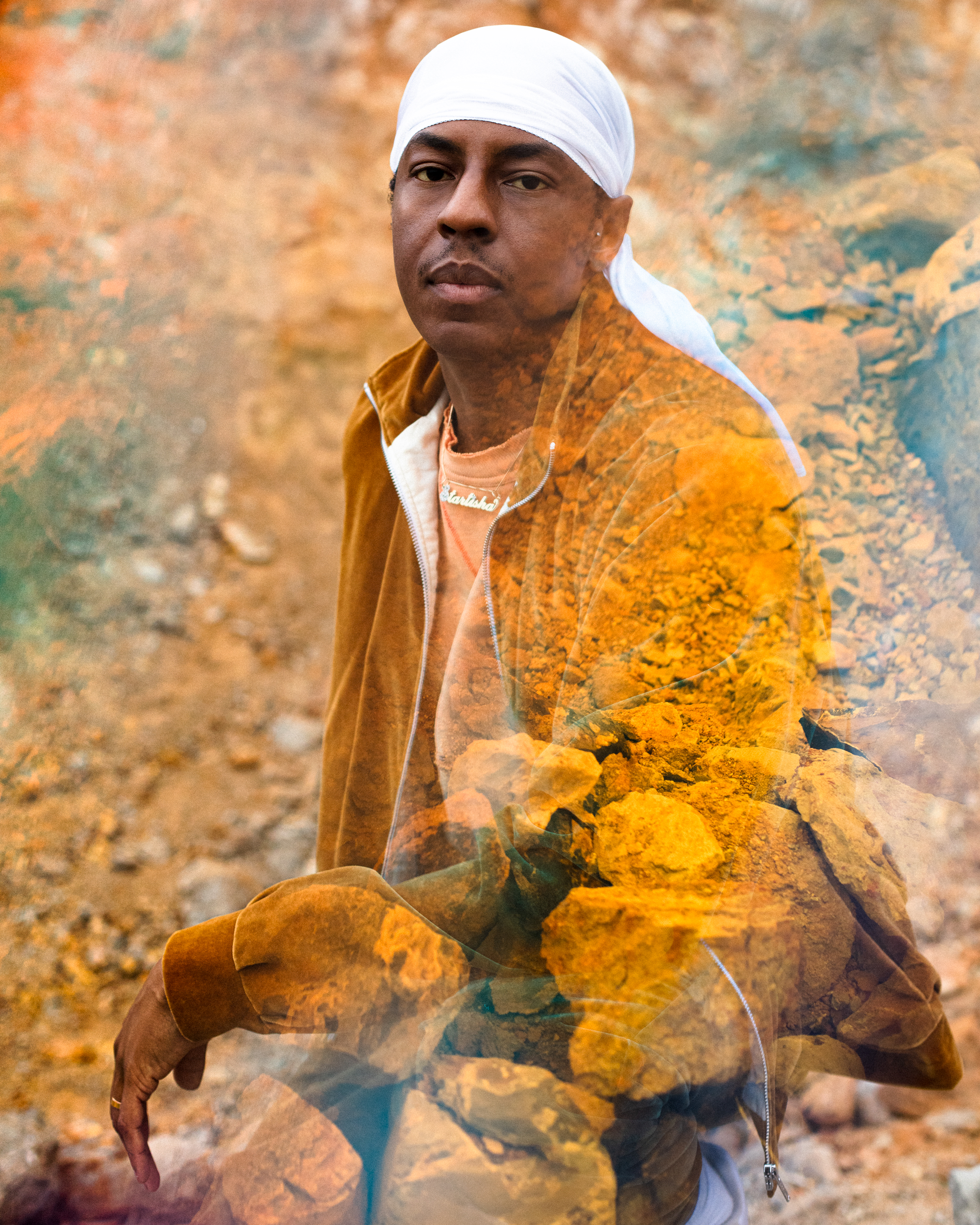
SUMNEY: Speaking of names, I want to talk about “Tiger Song,” because you talk about Malcolm [X] and Martin [Luther King Jr.] a lot in that song. You say, “Some might understand what I’m talking about.” And I’m embarrassed to admit that I don’t fully understand what you’re talking about. You’re drawing this line between Malcolm X and MLK with yourself sitting at the intersection. I was trying to decipher if you’re saying that you identify more with Martin than with Malcolm X, or that you identify with both or neither. Or maybe that’s a false dichotomy. Whatchu talkin’ ’bout?
NAEEM: [Laughs.] Man, thank you for this question. I’m so excited that you listened, and that you’re probably just as confused by the lyrics as I am. I wanted to be free in my thoughts and free in my response to black masculinity, and being raised a certain way. I wasn’t trying to side with Malcolm or Martin, but I was trying to figure out where I fit in a dichotomy of those two icons. One represents this peaceful resistance and one is more militant, but the song is not really about Malcolm and Martin—it’s about black masculinity in general. It’s kind of like what happens to the kid who feels like he doesn’t have a role model to really look up to.
You have a Christian and a Muslim leading the civil rights movement. And then you have James Baldwin, who’s an atheist, and his perspective is probably the perspective that’s going to last a lot longer in the end, but he wasn’t at the forefront of the movement. For me growing up, Baldwin was removed from this situation. I didn’t know about Baldwin until very recently. So it’s almost like you do have to make a choice. What I was looking at was, when it comes to the freedoms that we have today, as African-Americans, those freedoms kind of came out of the success of Martin Luther King’s peaceful march as a movement. But at the same time, we still like to give a lot of weight to being militant, being violent, being aggressive as signs of strength. And so I was a bit bitter in the fact that we still give this militant power so much weight, because at the end of the day, it wasn’t successful.
SUMNEY: I do know what you’re saying.
NAEEM: The only reason I’m really upset about this is because I have sickle cell anemia, so I could never compete or be an athlete. Basically, all the things that men were being rewarded for—being strong, being tough, being able to fight—were off-limits for me. And I didn’t really know where else to go. The song goes through this long journey of me trying to find my strength, so it’s not really about Malcolm or Martin. It’s about—
SUMNEY: It’s about you. That was very eloquent.
NAEEM: You asked a tough question.
SUMNEY: That’s what you brought me in for. I was thinking of black masculinity in your press shots. You’re wearing eyeshadow and a pearl earring. I just saw the single that came out for “Woo Woo Woo”—you’re wearing a tiara. Please do correct me if I’m wrong, but I don’t think we’ve seen you express in this way. Why is it important to do it now?
NAEEM: It’s totally new for me to play around with, I guess, gender roles. How do smart people say it?
SUMNEY: How do they say what?
NAEEM: How do smart people talk about gender fluidity? Like I said, all my favorite musicians show that duality in everything they do. I think it’s a really important way to challenge yourself, to express yourself.
SUMNEY: What was the genesis of the idea, visually?
NAEEM: There is this woman photographer, I can’t remember her name, but I went to a museum in L.A. and there’s this photograph of this woman kneeling on a chair wearing leopard print. She’s just giving it, serving the dopest face, and that was one of my references.
SUMNEY: The Deana Lawson photo [“Nikki’s Kitchen”].
NAEEM: Exactly. This is why I wanted to talk to you.
SUMNEY: [Laughs.] It’s a gorgeous image.
NAEEM: It was on my mood board and I wanted that attitude, so poised and beautiful yet raw. It’s not this airbrushed, filtered image. I don’t think that’s clear in the photo, but in early queer movements, in early drag movements, even in the pageantry, you could always somehow see the brutality of the world. That’s something I really wanted to take on.
SUMNEY: It’s like war paint. I wanted to talk to you about getting older. One of my favorite lyrics is from “Let Us Rave,” when you say, “Bitch, I ain’t nobody’s mentor.” Does that come from you being a veteran in the game? And has aging affected your writing?
NAEEM: I guess I am a veteran.
SUMNEY: Are you over the hill?
NAEEM: Now that I’m about to be 40, I’m like, “Wait, I’m still fucking alive. What the fuck?” So it’s kind of like, “Oh shit, you might end up being 80.” My life might be a bit more permanent than I thought it was going to be, so what do I have to say now?
